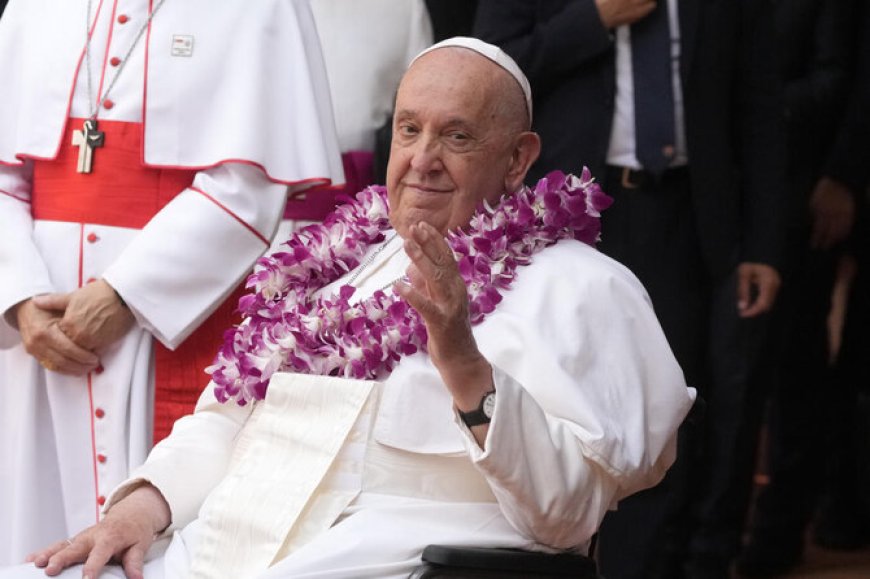Pope Francis Concludes Historic Asia Tour, Reaffirms Message of Interfaith Harmony
Pope Francis concluded his landmark four-nation trip through Asia on Friday with a visit to Singapore, where he emphasized the importance of interfaith tolerance and dialogue. The pontiff, who has consistently championed religious harmony as a remedy for global strife, wrapped up his journey by praising Singapore’s commitment to peaceful coexistence among its diverse religious communities.

Pope Francis concluded his landmark four-nation trip through Asia on Friday with a visit to Singapore, where he emphasized the importance of interfaith tolerance and dialogue. The pontiff, who has consistently championed religious harmony as a remedy for global strife, wrapped up his journey by praising Singapore’s commitment to peaceful coexistence among its diverse religious communities.
Speaking to a gathering of young people from various faiths, including Islam, Buddhism, and Christianity, Francis highlighted Singapore's unique blend of religious tolerance. In a nation where mosques, temples, and churches share space among modern skyscrapers, the Pope underscored that different faiths should come together in constructive dialogue, rather than asserting the superiority of any single belief system.
In an unscripted moment, Francis set aside his prepared speech and encouraged the youths present to embrace life boldly, even if it means making mistakes. Yet he quickly returned to his central message: "All religions are a path to arrive at God," he said, comparing faiths to different languages, each offering a way to connect with the divine. "But God is God for all," he added, underscoring the universal nature of spirituality.
A Message for Singapore’s Catholics
Singapore, with a population of just under six million, has a small but vibrant Catholic community, representing around 3.5% of the population. The majority of the city-state is Buddhist (31%), followed by Christians (19%), Muslims (15%), and those with no religious affiliation (about 20%). The Pope’s visit to this multicultural nation was aimed at strengthening the local Catholic community while celebrating Singapore’s tradition of religious harmony.
During his visit, Francis praised Singapore’s rapid economic development, but also issued a gentle plea for the fair treatment of the country’s immigrant workers. He called for these workers to be treated with dignity and given fair wages, a subtle nod to the growing discussions around labor rights in Southeast Asia's wealthiest nation.
Avoiding Controversy on Capital Punishment
Notably absent from the Pope’s public statements in Singapore was any mention of the country’s use of capital punishment, a topic he has vocally opposed throughout his pontificate. While Francis has previously condemned the death penalty, calling it "inadmissible" in all circumstances, he refrained from addressing the issue during his time in Singapore—a possible diplomatic gesture given the nation’s strict laws and his desire to maintain positive relations during this high-profile visit.
A Journey Across Asia
The Singapore leg of the Pope’s trip was the final stop on an 11-day tour that took him to Indonesia, Papua New Guinea, and East Timor. Covering 32,814 kilometers (20,390 miles) by air, it was not only the longest and farthest trip of his papacy but also one of the longest papal journeys in history. Only a few of Pope John Paul II's trips in the 1980s covered more distance.
Throughout his tour, Francis delivered a consistent message of peace, tolerance, and cooperation across faiths, echoing his efforts to foster dialogue between religious communities around the world. His trip came at a time when religious and geopolitical tensions continue to shape global events, making his call for unity and understanding all the more timely.
A Broader Global Context
The Pope’s visit to Singapore and his broader Asia trip were also being closely monitored in China, where the Vatican has been working to improve relations. The careful avoidance of politically sensitive issues during his stop in Singapore could be seen as part of these efforts, as the Vatican seeks to navigate complex diplomatic challenges in the region.
As Pope Francis returned to Rome on Friday after a 12-hour flight from Singapore, he left behind a lasting message of unity, interfaith understanding, and the hope that different religious traditions can work together to heal a troubled world.













































